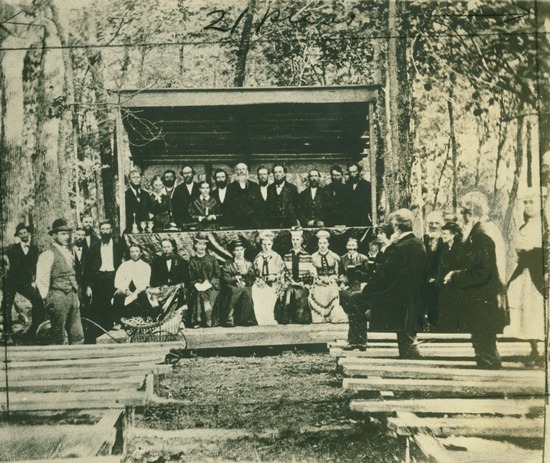What Is a Seventh-day Adventist Camp Meeting?
Although camp meetings didn’t begin with the Seventh-day Adventist Church, they’re as much an Adventist thing as haystacks.
Camp meeting is an extended event for Adventists (and non-Adventists) of all ages to gather and participate in spiritual seminars and activities. During the event, attendees often camp in tents, campers, or RVs.
Whether a weekend or ten days, the focus of the time is strengthening personal faith in Jesus and connecting the community of believers.
We’re going to dive into the following details:
- How camp meetings started
- What Adventist camp meetings are like today
- Why we still hold camp meetings
- Who can attend
- How to find a camp meeting near you
To begin, let’s take a brief tour of its history.
How camp meetings started

Courtesy of the Ellen G. White Estate, Inc.
The first camp meetings, as we know them today, started during a Presbyterian revival in Kentucky in the 1800s. At the time, another Protestant revival, the Second Great Awakening, was early underway.
The event was dubbed a “camp meeting” because the attendees camped out in their wagons and tents.
We don’t know how many attended, but at the same camp meeting the next year, between 20,000 and 30,000 people flocked to hear the preachers.1
The fervor quickly spread to other denominations, who began holding their own.
Adventists weren’t far behind.
Here’s how their camp meetings came about.
The first General Conference session had been held in 1868, but the people who attended came away disappointed at how business-like and dry it was. They had expected spiritual encouragement.2
James White, one of the founders of the Adventist Church, caught on to the sentiment. After some thinking, he suggested holding a “campmeeting,” an event that would be free from business and focus on spiritual matters.3
His plan was quickly put into action.
A couple months later, in September 1868, the first Adventist camp meeting took place in Wright, Michigan. It drew a crowd of over 2,000—among them James and Ellen White and J. N. Andrews. The meeting was so successful that they planned two more for that year in other states.4
Since then, Adventist camp meetings have become annual events across the United States and even the world.
What an Adventist camp meeting is like today
Camp meetings today are in many ways similar to when they started. They’re generally held sometime between late spring and early summer. The programming still focuses on spiritual growth and revival. And many people still camp, too.
But unlike those of old, today’s participants don’t always stay in tents—they may bring an RV or camper, or rent a cabin. Many also stay in other people’s homes or in housing provided by the church.
Some meetings take place on school campuses, where camping isn’t always conducive. There, attendees might stay in dorm rooms and convene in a gym or auditorium instead of under big white tents.
Length
Although many meetings are still the traditional week in length, some are as long as nine days, and others are just a weekend or Sabbath convocation.
Cost
Camp meeting can be as inexpensive or as expensive as you want it to be. If you come just for the day and bring your own food, or stay at someone’s house, it’ll be free. But to eat at the cafeteria, have a campsite, or join certain workshops, you will most likely have to pay a fee to help cover costs.
Programs
Another feature today is programs for different ages. Children can take part in classes geared for them, while adults can go to adult classes. But there is also time throughout the day for families to participate in events together.
Let’s get a feel for what that might look like.
A typical camp meeting schedule
Every camp meeting will have its own variations in programming and time segments, but here’s a basic outline of a day:
- Prayer session. Rise and shine! This is generally the first event of the day and could be as early as 5:00 in the morning. Here, participants pray for each other and have a devotional time to kick off the day. However, this, as with every other event, is optional, so don’t worry if you’re not an early riser!
- Breakfast. Campers may cook their own, and usually, the cafeteria provides something for a fee.
- Activities and workshops. These activities focus on specific practical topics for Christians and are usually divided by age. They may last an hour or two. On Sabbath, this time slot is reserved for Sabbath School.
- Morning meeting. This event is typically two hours long and is divided by age to best suit the wide range of people. Classes are held for infants (0–2), kindergarteners (3–6), primary ages (7–9), juniors (10–12), earliteens (13–14), youth (15–18), and young adults (19+). Adults attend the main meeting and listen to a guest speaker. Over the years, these guest speakers have included well-known Adventist evangelists like Shawn Boonstra, Doug Bachelor, or John Bradshaw. On Sabbath, this period is the main church service.
- Lunch. Once again, families may prepare their own midday meal or go to the cafeteria.
- Afternoon workshops. Like morning workshops, this section of the day could include many different activities for all age ranges.
- Afternoon meeting. Each age group will have its own activity or seminar for another hour or two.
- Supper and family time. This slot gives families the opportunity to spend some time together and catch up with friends.
- Evening meeting. One last event closes out the day. Sometimes, it’s a concert; sometimes, it’s a meeting like the others during the day. This usually ends by 9:00 pm or so.
Participants can pick and choose what activities and seminars they’d like to attend throughout the day to take advantage of the many benefits of the camp meeting program.
Why Adventists still hold camp meetings
The event serves many purposes, but the main one is to revive and enrich the spiritual lives of those who attend.5
Sometimes, the cares and frustrations and worries of life can seem overwhelming. But camp meeting offers a hiatus from all that to focus on what really matters: your spiritual life.6 It’s a time to rest and take in encouraging, wholesome thoughts.
But you might be thinking, I can do that at church or on my own. Why camp meeting?
Camp meeting isn’t just about individual spirituality. It’s also a huge community revival that connects the larger church body to encourage each other, build each other up, and learn together.
Friendship is a key aspect of that. At events like camp meeting, we have the chance to catch up with friends we don’t often see.
It also gives us a chance to reach out. You may run into people who aren’t Adventist—and maybe not even Christian. This is your opportunity to befriend and welcome them into the community, answering questions they might have along the way.
Who can attend camp meeting?
Anyone! All are welcome and encouraged to come, whether they attend an Adventist Church, another church, or no church at all.
Especially for those who are new to the Christian faith, camp meeting is a great way to meet Adventist Christians in a more casual setting. You don’t have to know, do, or be anything to learn about Jesus Christ and His love.
How to find a camp meeting near you
The best way to find your nearest yearly camp meeting is to ask your local pastor or someone else at your Adventist Church. You can also search online for ones in your state.
These are a few of the ones in the North American Division of Seventh-day Adventists (NAD):
- Soquel: Central California
- Rocky Mountain: Several meetings in Wyoming and Colorado
- Carolina: North Carolina
- Wisconsin
There are also camp meetings for different cultures and languages, such as Campestre Hispano in various states for Spanish speakers or the Native American Camp Meeting.
And if you can’t attend in person, some have livestream or video archives available.
Camp meeting has been part of Adventist culture for a long time. And though times have changed and we don’t camp in wagons anymore, one thing remains the same:
The need for humans to connect with Jesus and one another.
Camp meetings help meet that need.
If you’d like to learn about other Adventist ministries that bring people together,
- Spangler, J. R., “Workshops for Spiritual Revival,” Review and Herald, May 30, 1968. [↵]
- Poirier, Merle, “Camp Meeting,” Adventist Review.org. [↵]
- Ibid.[↵]
- Ibid. [↵]
- “Why Camp Meetings?” Ministry Magazine. [↵]
- Spangler, J. R., “Workshops for Spiritual Revival,” Review and Herald, May 30, 1968. [↵]
Related Articles
Questions about Adventists? Ask here!
Find answers to your questions about Seventh-day Adventists
More Answers
The Health Benefits of Fresh Air You Should Know About
The Health Benefits of Fresh Air You Should Know About“When you can’t breathe, nothing else matters,” the American Lung Association tells us. And while that’s true, the kind of air you’re breathing will determine the health benefits you experience. Breathing fresh...
What Do Seventh-day Adventists Choose to Eat?
What Do Seventh-day Adventists Choose to Eat?Food blogs overwhelm the internet; food fads are all the rage; and copycat and healthy versions of food are the subject of many a get-together. Eating—and eating the best way—is a big deal. And everybody has a different...
10 Incredible Ways Sunlight Can Improve Your Health
10 Incredible Ways Sunlight Can Improve Your HealthAre you concerned about sunlight’s negative effects? You might be the one who lathers on the sunscreen and covers up when you go outside. Or maybe you avoid being outside as much as possible. You might be surprised,...
Why Is Water So Important?
Why Is Water So Important?We all know that water is a substance we can’t live without. It quenches our thirst and keeps us hydrated on the inside. And it’s necessary for hygiene and cleansing on the outside too. But did you know that the cleansing properties of water...
Ellen White’s Writings and the Adventist Health Message
Seventh-day Adventists are known for their emphasis on healthy living. And Ellen G. White was a significant influence in the development of this priority and practice among Adventists.
Health Clinics
Ellen White and Adventist Healthcare—Ahead of Their Time Medical care in the mid-1800s was primitive, to say the least. Basic concepts we take for granted—such as proper handwashing or recognizing the dangers of bloodletting—were nonexistent. And doctors often had...
What Did Ellen White Teach about Vegetarianism?
What Did Ellen White Teach about Vegetarianism?One thing you might have heard about Seventh-day Adventists is their emphasis on a vegetarian lifestyle. If you’re wondering why that is, it goes back to our church’s humble beginnings: As Adventists studied the Bible,...
How Ellen White’s Teachings Can Improve Your Health
How Ellen White’s Teachings Can Improve Your Health Healthcare in the nineteenth century was said to leave “more disease than it took away” with its use of bloodletting and “medicines” like mercury and arsenic.1 As people questioned these methods, new approaches...
Change Your Perspective on Life with These 5 Mindsets
5 Biblical Mindsets to Change Your Life for the Better Sometimes, life is just plain hard. There’s no way around it. So would thinking about things differently really change anything? Our perspective on life, and everything it throws at us, affects more than we’re...
Bible Promises for When You’re Worried or Fearful
Bible Promises for When You’re Worried or Fearful The Bible is full of beautiful promises that can comfort us in a variety of situations. They can give us hope when we are hopeless, make us feel grateful for God’s love, and comfort us when we’re grieving or suffering....
12 Practical Ways to Overcome Worry
12 Practical Ways to Overcome Worry DISCLAIMER: This content is for informational purposes only. It does not constitute any professional medical advice and is not intended as a substitute for professional mental health therapy. It’s easy to get stuck in a cycle of...
How the Bible Talks About Worry, Fear, and Anxiety
How the Bible Talks About Worry, Fear, and Anxiety Worry and fear are the ingredients of anxiety. It’s easy to see how the world isn’t perfect—and the anticipation of a bad event or experience (that may or may not even happen) can end up draining the peace and...
How to Calm Anxious Thoughts, Using the Bible
How to Calm Anxious Thoughts, Using the Bible You were expecting a phone call from your daughter half an hour ago, and she still hasn’t called. She’s also not answering your calls. You feel your heart thumping as your thoughts race: What if she’s been in a car...
What You Should Know About the Adventist Health Studies
What You Should Know About the Adventist Health StudiesYou may have heard that Seventh-day Adventists care about health. But what you may not know is that Adventists have been the subjects of long-term research into lifestyle and health. Since 1958, researchers from...
Benefits of Sunlight
Yes, There Are Health Benefits of SunlightDespite the bad reputation it’s gotten, sunlight is generally associated with positivity, as shown by songs like “You Are My Sunshine,” or phrases that refer to delightful people as having a “sunny disposition.” There’s a...
Why Your Body Needs Rest for Optimal Health
Why Your Body Needs Rest for Optimal HealthStruggling to think straight? Wondering why you can’t remember that important tidbit you heard earlier today? Feeling like your emotions are about to explode? These are just some of the symptoms that can reveal your need for...
The Seventh-day Adventist Diet: One of Our Key Longevity Secrets
The Seventh-day Adventist Diet: One of Our Key Longevity SecretsOats, avocados, lentils, tofu—probably not what you first think of in a standard American diet. But if you show up at the home of an Adventist, chances are you may be served one of these staples. Out of a...
Why You Need Fresh Air
Why You Need Fresh Air“When you can’t breathe, nothing else matters,” the American Lung Association tells us. We couldn’t agree more! Breathing in clean air is an essential part of caring for our bodies, which God has given us. Together with other health principles,...
Sabbath Meal
Everything You Need to Know About Sabbath MealsFor Seventh-day Adventists, sharing a Sabbath meal with friends and family is one of the most special and memorable parts of the Sabbath. That’s why we want to share with you all about Sabbath meals and why they’re such a...
Adventists and Healthy Living
Adventists and Healthy LivingWhat’s the Adventist “Health Message” All About? One thing Seventh-day Adventists are known for is their emphasis on living healthy lives. Since our bodies are living temples of the Holy Spirit (1 Corinthians 6:19, 20), we strive to stay...
Water’s Importance—Physical Benefits and Spiritual Applications
Water’s Importance—Physical Benefits and Spiritual Applications We all know that water is a substance we can’t live without. Not only does it quench our thirst and keep us hydrated from the inside, but it’s necessary for hygiene and cleansing on the outside as well....
How Important is a “Day of Rest?”
How Important is a “Day of Rest?” Why God Created a Day for Downtime by Martin Casper Do you ever experience the feeling of complete overload? Do you feel like the only way you can get ahead is by slamming it 24/7? I hear these types of comments more and more...
7 Reasons Why a Day of Rest is Important
7 Reasons Why a Day of Rest is ImportantWe live in a fast-paced world. It seems as if success is measured in how much you can do in a short amount of time. (Extra points for the service or product that is available 24/7). The idea that we will be more successful if we...
How do Adventists choose what to eat?
How do Adventists choose what to eat?Every day, parents go through the ritual of getting their kids to eat what is healthy and good while trying to steer them away from what can hinder the growth of their developing bodies. Nutritionists work with their clients to...
How Can I Have a Better Marriage?
Is it possible to have a happy marriage?
How do Adventists make movie and music choices?
How do Adventists make movie and music choices?Cinema has come a long way since the first clips of motion pictures came to light in 1878. As the decades rolled on, film and music producers have created rivers of movies and albums for the masses. Today, watching movies...
Why are many Adventists Vegetarian?
Why are many Adventists Vegetarian?The diet intended for man is outlined in Genesis 1:29, “And God said, ‘See, I have given you every herb that yields seed which is on the face of all the earth, and every tree whose fruit yields seed; to you it shall be for food.’”...
Didn’t find your answer? Ask us!
We understand your concern of having questions but not knowing who to ask—we’ve felt it ourselves. When you’re ready to learn more about Adventists, send us a question! We know a thing or two about Adventists.























